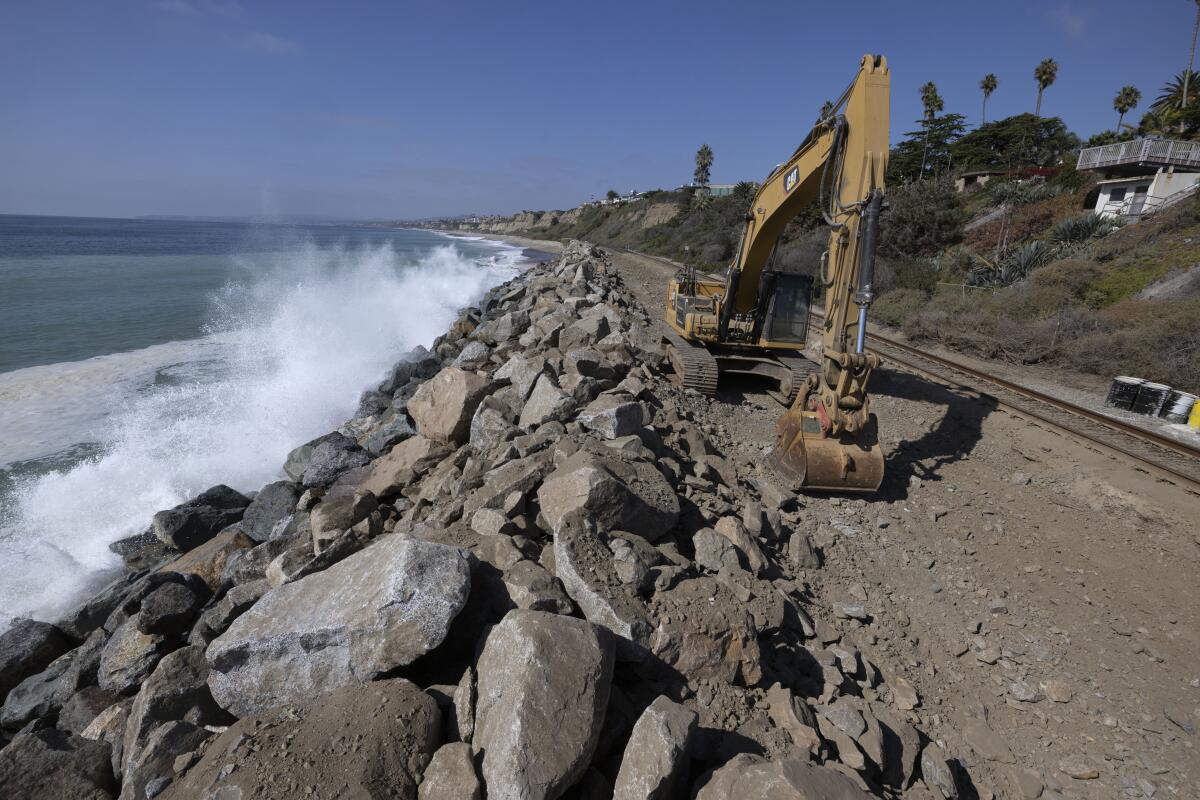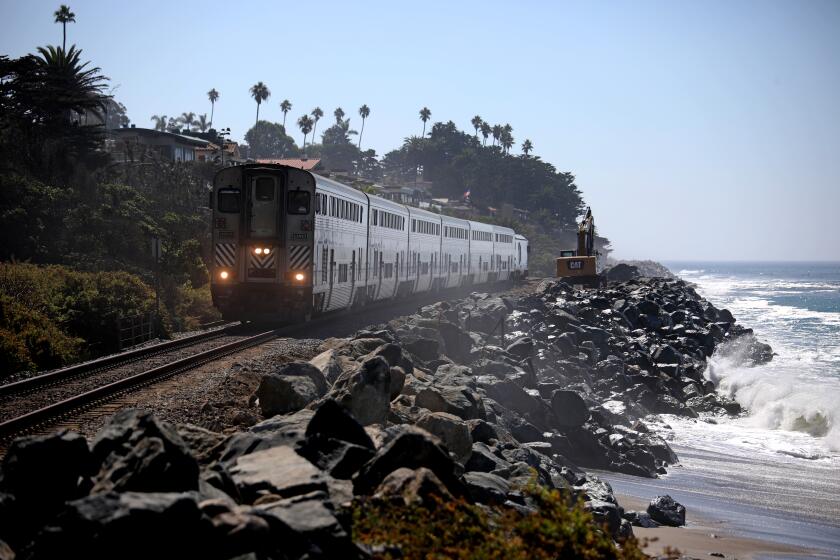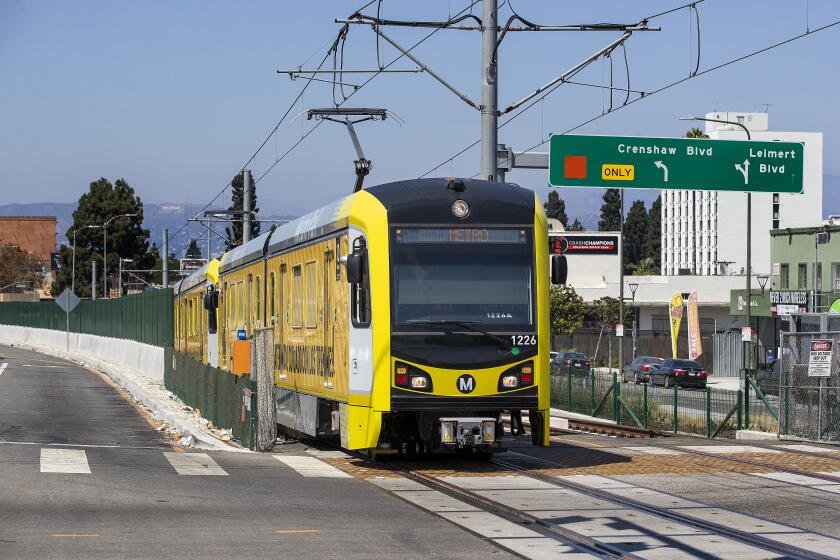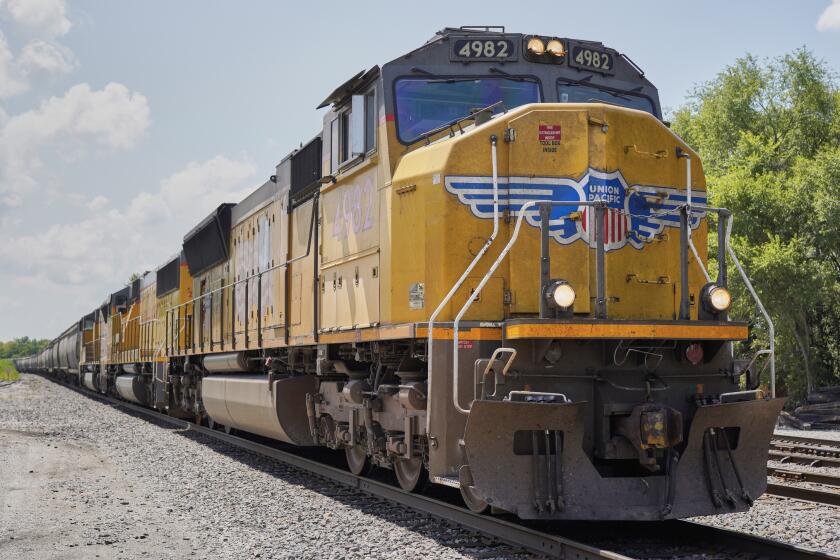Amtrak, Metrolink unavailable between O.C. and San Diego County as work begins to stabilize railroad tracks

- Share via
California and Orange County transportation officials declared an emergency and approved $6 million this week for construction to stabilize the sliding railroad tracks in San Clemente, a job expected to take 30 to 45 days before passenger service can resume.
Transit officials suspended Amtrak passenger and Metrolink commuter rail service Friday until further notice between Orange and San Diego counties because of the gradually moving hillside along about 700 feet of the tracks just north of Camp Pendleton.
The 140-year-old coastal rail line is the only viable route for passenger and freight trains between San Diego and the rest of the United States. The 350-mile LOSSAN corridor between San Diego, Los Angeles and San Luis Obispo is one of the nation’s busiest rail routes.
Coaster commuter service between Oceanside and San Diego is not affected. However, the tracks on the coastal bluffs in Del Mar also are threatened by coastal erosion. Trains have been halted or slowed there in the past for a series of stabilization projects and repairs.
Passenger service between Orange County and Oceanside was suspended for about three weeks after heavy rain and storm surge in September 2021 caused some movement of the tracks at San Clemente. More than 18,000 tons of boulders were brought in by BNSF freight trains and placed on the coastal side of the railroad as riprap for stabilization.
Officials with Metrolink are still responding to recent movement detected in the railway’s foundation near San Clemente after Tropical Storm Kay.
Annual ridership is nearly 3 million on Amtrak’s Pacific Surfliner trains and 5 million on Coaster and Metrolink commuter trains, according to the Orange County Transportation Authority. Freight trains carry $1 billion in goods annually on the LOSSAN corridor, according to a 2021 report by state Secretary of Transportation David S. Kim.
BNSF uses the rails under a “shared-use agreement” that allows the freight company to make its own determination when its trains can run. Normally it operates about six trains daily to and from rail terminals at the Port of San Diego, carrying everything from new foreign cars to building supplies and wind turbine blades. A company spokesman did not respond to messages Tuesday.
One company, the Pasha Group, has its own 157-acre terminal at San Diego’s port, where it processes up to 400,000 vehicles annually, nearly all of which are shipped by rail.
“Our understanding is that one train for goods movement will operate daily through the corridor, although BNSF is also delivering riprap to the site, so there may be additional trains, all operating at reduced speeds through the area,” Orange County Transportation Authority spokesman Eric Carpenter said in an email Tuesday.
Geologists and engineers monitoring the slide area detected new movement at the rate of 0.01 inch to 0.04 inch per day after another storm last month. Passenger service was halted Sept. 30, and BNSF is again bringing in rock for more riprap.
Metro is set to open much of the Crenshaw/LAX line Oct. 7, but it won’t connect to the airport until 2024, officials say.
In addition to the immediate repair work, the Orange County Transportation Authority is reviewing long-term options to protect the coastal rail line, officials said.
“This stabilization effort is clearly an interim fix, and OCTA will continue to work with its partners on a long-term solution,” Carpenter said. “That could include re-routing the track further from the ocean. But such a fix would require years of planning and would be expensive. So right now we are focused on this interim fix.”
Studies to reroute the tracks in Del Mar, probably through a tunnel, have been underway for years. Construction costs could exceed $4 billion, and completion is probably decades away. But the state awarded $300 million earlier this year to local agencies for further planning to advance the project.
The emergency declaration approved Monday by the OCTA board of directors cleared the way to hire a contractor to proceed with the stabilization work in San Clemente.
“Our first priority, of course, is the safety and well-being of all rail passengers and crew members who travel through this area,” said OCTA Chair Mark A. Murphy, who is also the mayor of Orange, in a news release.
The operators of the train were killed when it crashed into rail cars parked on alternate tracks that run along the Salton Sea.
“We greatly appreciate Caltrans and the California Transportation Commission taking decisive action on this and working with us so quickly on advancing a solution,” said OCTA CEO Darrell E. Johnson.
“We understand the urgency of this issue and are working around the clock with all of our partners, including at Metrolink, Amtrak Pacific Surfliner, the state and our elected leaders to complete this work as efficiently as possible, always prioritizing safety,” Johnson said.
OCTA is working with federal and state officials to secure additional funding for the emergency construction, which is expected to cost about $12 million overall.
“A timeline for completing the work is still being completed,” Carpenter said. “Clearing vegetation and staging for emergency work is anticipated to begin this week, with installation of ground anchors as soon as possible.”
The metal ground anchors will be inserted at a 45-degree angle into the bedrock beneath the slope to keep it from slipping further toward the track and the ocean, he said.
Like the blufftop segment in Del Mar, the San Clemente section of track is one of the few places on the corridor where there’s not enough right-of-way to add a second set of tracks. Relocation could solve that problem.
Multiple sets of rails allow trains to pass each other and speeds up service. More than two-thirds of the San Diego County segment has been double-tracked so far, with plans to eventually double-track more than 97% of the corridor, according to the San Diego Assn. of Governments.
OCTA owns the railroad right-of-way between Fullerton, near Anaheim, and the San Diego County border. North County Transit District owns the right-of-way from the Orange County border to the Santa Fe Depot in downtown San Diego.
Amtrak’s Office of Inspector General issued a memorandum Dec. 6, 2021, which noted that while Amtrak met all its regulatory obligations, it “may be missing opportunities to gather all the information it needs” to assure safety in places such as San Clemente in Del Mar.
The inspector general’s memo urged the national railroad operator to participate more actively in related working groups and discussions with the OCTA, NCTD and other agencies.
Scot Naparstek, Amtrak’s executive vice president and chief operations officer, said in response he would designate a company representative to participate in any future discussions of evolving coastal conditions, remediation efforts and the potential realignment of the train’s Pacific Surfliner route.
More to Read
Sign up for Essential California
The most important California stories and recommendations in your inbox every morning.
You may occasionally receive promotional content from the Los Angeles Times.













